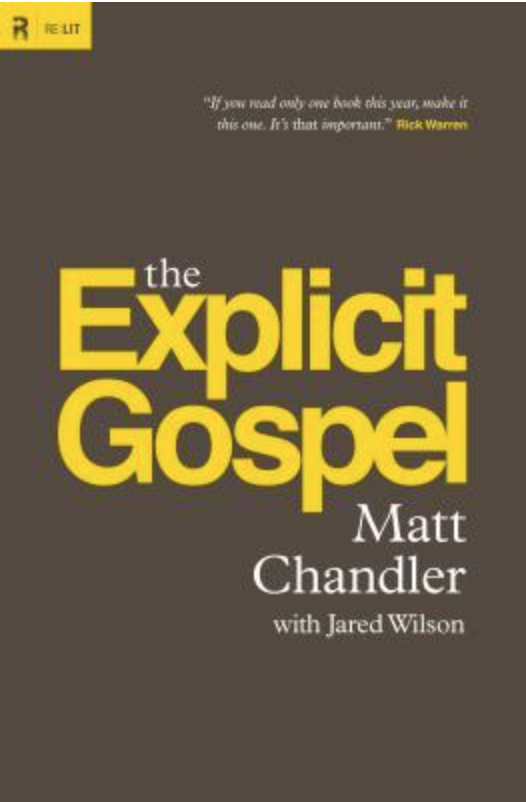See Parts II, III, IV, and V.
Two years ago my small group attempted to read The Explicit Gospel by Matt Chandler. I say attempted, because we voted to abandon it halfway through. The book upset me on many levels: as a Christian, as a writer, as someone trained in literary analysis, and as a woman. Hence the existence of this thorough and lengthy book review. Does this book have good qualities? Perhaps, but the bad heavily outweighs the good. This book is not the explicit gospel and will do more harm than good to those who read it.
To begin, some facts about the book: it was published in 2012 by Crossway; endorsed by James MacDonald, Mark Dever, Ed Stetzer, and Rick Warren, among others; and is 240 pages. Matt Chandler is the lead pastor at The Village Church in Flower Mound, Texas (a Southern Baptist church), and president of the Acts 29 Network.
Chandler looks at the gospel from two vantage points, which he calls the gospel on the ground and the gospel in the air. The gospel on the ground “traces the Biblical narrative of God, Man, Christ, Response…we see clearly the work of the cross in our lives and the lives of those around us.” (16) The gospel in the air is the meta-narrative, “reveal[ing] to us the big picture of God’s plan of restoration from the beginning of time to the end of time and the redemption of his creation.” (16)
The Gospel on the Ground
Chapter one’s focus is God, who is depicted as a terrifying, narcissistic glory hound, the focus on his power and sovereignty. Chandler writes, “From beginning to end, the Scriptures reveal that the foremost desire of God’s heart is not our salvation but rather the glory of his own name.” (33-34) How does he define glory? He doesn’t. He tells us about God’s transcendent creativity, his sovereign knowing, his perfect self-sufficiency, and his glorious self-regard, but he does not define glory. God doesn’t need us; God reigns supreme, he says. “This world is not present…so that you and I might be saved or lost but so that God might be glorified in his infinite perfections.” (34)
But this depiction of God is incomplete and therefore terribly warped. God says of himself in Exodus 34 that he is compassionate and gracious, slow to anger, abounding in love and faithfulness, maintaining love to thousands, and forgiving wickedness, rebellion, and sin while punishing the guilty, yet Chandler mentions none of these attributes.
After describing God’s power, creativity, and sovereignty, he provides a list of Bible verses to prove that God’s glory is his chief concern (34-35). Yet the Psalms tell us over and over that God is worthy of praise and glory because he is good, because he is love, because of his great deeds, and because he is sovereign. Describing only the omnipotence and glorious self-regard of God reduces our majestic loving Father to a monstrous deity who regards us as insignificant gnats next to his own glory.
How can this book explain the explicit gospel when it does not tell the whole truth of who God is?
Chapter two focuses on man – our belittlement of his name and turning away from him and God’s severity toward us as a result. Chandler introduces the idea of humanity’s total depravity, which colors every chapter in the rest of the book.
Rather than give equal emphasis to God’s kindness toward fallen humanity and his severity toward us, as Paul does in Romans 11:22, Chandler brushes by God’s kindness with a few quick words about how we “get that stuff somewhat readily” (40) and then spends page after page describing God’s severity and wrath and the horrors of hell (41-51).
Ironically, given the preceding pages, he says, “You cannot scare anyone into heaven. Heaven is not a place for those who are afraid of hell; it’s a place for those who love God.” (49) Yet two pages prior, he paraphrases Jesus as saying in Luke 12:4-5, “Seriously? You’re afraid of what people think of you more than you’re afraid of me? You’re afraid of what people can do to you rather than what I can do to you? You’re more afraid of how people might perceive you than how I perceive you? Are you serious? Listen, the worst they can do is kill you.” (47)
If that is not scaring people into heaven, I don’t know what is. Chapter two contains not a single reference to imago dei, that we are image-bearers of God, not a single mention that we are beloved by him. In Luke 12:6-7, Jesus tells his disciples not to be afraid, that they are more valuable to God than the sparrows that He cares for. Divorcing verses 4 and 5 from verses 6 and 7 paints a false picture of God’s love. Do we deserve that love? The answer is both yes and no: we are fallen sinners who have wandered far from God, and yet God has said we are precious and worth the sacrifice of his son, therefore by his decree we are worthy.
Christianity is full of paradoxes: humanity is broken and depraved and made in the image of God; God is holy and mighty and love; God knows every choice every human will make and humans are free to make those choices; we are distanced from God because of our brokenness and he bridged that distance with his great love.
How can this book explain the explicit gospel when it does not tell the whole truth of who humanity is?
Chapter three is centered on Christ the sacrificial lamb. After a brief discussion of the horror of the crucifixion, Chandler wades through the Old Testament and the sacrifices God required of Israel: “And in the tent of meetings and in Jerusalem, blood was always flowing. Blood constantly coursed out of slashed arteries and flowed from the temple. Can you imagine the stench in Jerusalem? Can you imagine hundreds and thousands of people regularly carrying a goat, a lamb, a chicken, or a dove into the place of sacrifice and cutting its throat and draining its blood? A river of blood is flowing out of the temple.” (60-61)
Jesus was the perfect sacrifice, the sacrifice to end all others, to appease God’s wrath. How odd that in a chapter titled “Jesus,” the only description of Jesus is as a bloody sacrifice, e.g., “The blade of God’s wrath penetrates the Son and bleeds him, and he absorbs the wrath of God toward mankind.” (62)
Jesus is a person, who lived and breathed and had an entire life and ministry before his death. Jesus is God, Jesus is Messiah, Jesus is active and present and real. He is not a bleating sheep helplessly sent off to be sacrificed to a vengeful God on behalf of mewling humanity. He walked among us and chose to give himself up. He is Lord. Jesus’ life and ministry are vital to his message; treating the cross as the only event in Jesus’ life relevant to the gospel is cherry picking.
Equally disturbing as the way Jesus is treated in this chapter is the way Chandler fixates on the cross as the entire gospel. “The cross now stands as the central tenet of all we believe about salvation,” he says. (58) But without the resurrection, without Jesus conquering death and rising again, the cross means nothing. As Paul says in 1 Corinthians 15, “And if Christ has not been raised, our preaching is useless and so is your faith…And if Christ has not been raised, your faith is futile; you are still in your sins.”
A gospel without the resurrection is not the gospel at all. Jesus defeated sin and death by dying and rising again, not by sacrificing himself on the cross alone. The cross and the resurrection cannot be separated; to ignore the resurrection is to preach a false gospel. In this entire book, the resurrection is mentioned only eight times, always as a brief aside, and not once in this chapter.
This chapter is full of heavy-handed, twisted penal substitutionary atonement theology. Penal substitutionary atonement is defined as the atonement theory that Jesus died on the cross as a substitute for sinners. God directed his wrath at Jesus, who bore the guilt of our sins and the weight of our punishment on our behalf. God’s wrath was satisfied by Jesus’ sacrifice and God now forgives sinners freely without compromising his righteousness.
This doctrine as depicted in this book is horrifying. Kyle J. Howard points out that without the unity of the Trinity, the Godhead acting with one will, this doctrine is abusive. God pouring wrath onto Jesus as his hapless victim is not the same thing as “the Godhead working together to accomplish a goal.” He says, “When preachers & theologians discuss the Cross, & do so [through] personally punitive language [between] The Father & The Son; they are misrepresenting Trinitarian relations that lead to blasphemy & profound harm.”
Chandler pays lip service to this issue and cites John 10:18 (58), yet uses “personally punitive language” throughout the book, including mere paragraphs prior to his caveat: “The cross of Christ was God’s idea. The death of Jesus was God’s idea…the cross of Christ cast its shadow across all of eternity. It was the predetermined plan of God. The death of Jesus, the wrath-absorbing cross of Christ, was the plan of God before creation.” (57-58)
The Trinity is a minor detail in this depiction of the cross, mentioned in two sentences in this chapter, and not even listed in the book’s index. Nor is there any discussion of Jesus as our Savior and Messiah, also missing from the index.
How can this book explain the explicit gospel when it ignores the resurrection and reduces Jesus to a bloody sacrifice subject to divine punishment rather than one member of the Godhead choosing to give himself up for humanity?
Chapter four looks at humanity’s response to everything that Chandler has described so far: God, Man, and Christ. Our response, Chandler says, is far too often a works-based faith, “people who have been conformed to a pattern of religious behavior but not transformed by the Holy Spirit of God.” (72)
The response he chooses to focus on is based in Isaiah 6, where God instructs Isaiah to tell the people their hearts will be dull and unresponsive to the Lord, and backed up by Matthew 13, the parable of the sower, and Acts 2, Peter’s sermon on the day of Pentecost. He uses these texts to prove his point that the gospel is not seeker-sensitive, that “we are never, ever, ever going to make Christianity so cool that everybody wants it.” (80)
This leads directly to the idea that God hardens hearts (71), that “the hearer of the gospel is responsible for his response, but God is responsible for his ability to do so,” that “blessed are the eyes that see and the ears that hear because the Spirit of God has opened them to do so.” (77)
Let’s be clear: this is only one theological perspective among many that Christians throughout history and throughout the world have held to. The idea that God chooses who will be saved and who will not respond to the gospel is unconditional election, the U in the acronym TULIP, which sums up the basic doctrines of Calvinism. This flows directly into the L for limited atonement – Christ died only for the sins of the elect, or those chosen by God for saving.
These doctrines pop up throughout the entire book, despite Chandler mentioning nowhere that the gospel he is presenting is rooted in a twisted version of Calvinism. This chapter includes only a brief mention of irresistible grace (I): “It is all of grace that some do hear” (77) and of course always comes back to total depravity (T): “Because we are stained with sin from conception, we are rushing headlong into the fires of hell before we can even walk.” (64) This assertion leaves no room for the concept of the age of accountability.
The book does not even mention the extraordinary beauty of the gospel, the love and forgiveness and new life Christ offers us that draw us to the gospel. It instead implies that because the gospel is offensive and bloody, only through God choosing to soften hearts will anyone respond to it. Certainly no one would be drawn to respond to this version of the gospel of their own accord!
I am not debating Calvinism in this review. Many Christians hold fast to these doctrines and it is no reflection either positive or negative on their commitment to Jesus, particularly since the Calvinist theology within this book is so one-dimensional and limited. But I find Chandler to be intellectually dishonest because he fails entirely to acknowledge that he is presenting one specific theological tradition as the gospel and insisting that only this theological tradition in all its minutia is the real gospel.
Now, if your heart is not hardened to the gospel but is instead softened, this chapter does not allow you to rest in and be transformed by Christ’s magnificent love for you and completed work through his death and resurrection. Instead, “we must test ourselves to see if we are in the faith” (84) and “be very careful about going to church, reading [our] Bible[s], saying prayers, doing good deeds, and reading books like this through anything but faith in the living Lord.” (85)
How utterly exhausting. There is no joy, no life, no freedom in this response to the gospel. Did Jesus not say that he came so that we would have abundant life? Did Paul not say that it is for freedom that Christ has set us free? Focusing intently on your motivations for doing good works should not be your primary response to the Good News.
How can this book explain the explicit gospel when it describes a response to the gospel completely devoid of transformation and new life in Christ?






